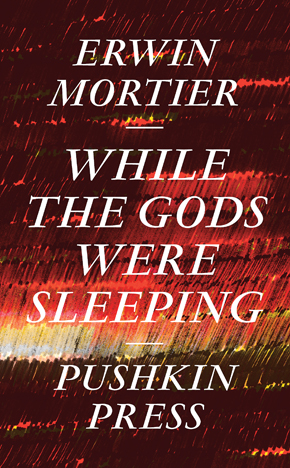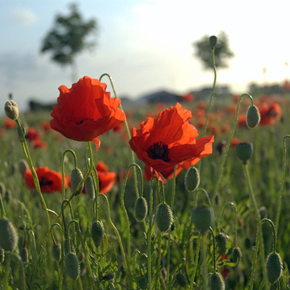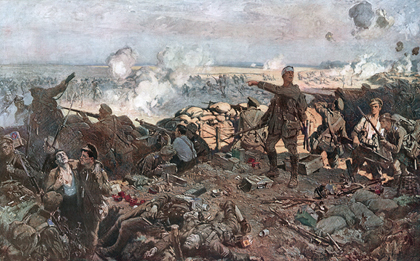Erwin Mortier: History is debate
by Mark ReynoldsErwin Mortier’s meticulously crafted novels about memory, language and identity are acclaimed across the world and his latest, an attempt to plug a surprising gap in Belgian literature about the Great War, was immediately dubbed a modern classic. I catch up with him on the release of the English-language edition.
MR: Your first three novels Marcel, My Second Skin and Shutterspeed have been presented as an interlinked cycle about male identity, among other themes. Were they conceived as a series?
EM: More or less. Male identity is part of what the novels are playing with, it’s also about memory, of course, and childhood, and I think most of my novels will always be about language itself, and the limits and possibilities of language as a vehicle for memory and narrative – narratives can deceive us as well as give oxygen to existence. So that’s what I was toying with in the first novels, and in a sense this novel comes into that at a deeper, more adult level.
On the face of it, While the Gods Were Sleeping is a world apart from the earlier novels in terms of character and setting. What drew you towards Helena, the elderly female narrator, and her defining experiences during the First World War?
My husband makes a big joke that I had to inhabit the mind of a 90-year-old widow in order to finally find my voice! From my earlier novels on I knew I had to develop the things that seemingly preoccupy me as a writer, to project them onto a much larger dimension and scale. Where the first book was on the level of a child or adolescent, those themes are now played out on the scale of our national memory. My first concern in writing the novel was that for some strange reason in Belgium we don’t have a tradition of Great War novels, there’s a hiatus in our collective memory, as it were. There are a lot of private documents, letters and diaries, et cetera, but no great novel was produced during or after the war. I found that to be a strange condition in our collective imagination and literary heritage, so I decided to write this novel as a kind of symbolic gift to our national memory.
It’s very odd that there hasn’t been a big war novel, when so much of the action was played out in northern Belgium.
It’s an absolute mystery, because in the UK of course, and in France and Germany there were a train of brilliant novels and poetry. I think it has to do with the fact that our major artists were abroad – because of course when the Germans came into Belgium in August 1914, more than one and a half million Belgians fled the country, were pushed towards the UK, towards Holland, towards France. So a lot of them were not around, and the ones that stayed couldn’t move because in Occupied Belgium you needed about a hundred permits to go from one city to another. And also there was very severe censorship, you risked your life if you were to keep a diary. Some did, of course, and kept it hidden.
We changed the political and social landscape, and I think most people just wanted to look to the future rather than looking back. And for some reason the war got forgotten.”
Even though we were the first industrialised nation on the continent, the war brought a brutal introduction of modernity. We were modern in our economy and our industry, but we still had a rather cosy Victorian, 19th-century view of ourselves. The war brought great destruction of the country and its economic infrastructure, but amidst the destruction a new nation was forged because the war quickened certain political developments. For instance, within a week of Armistice Day in 1918 the king signed universal suffrage into law, which meant for instance that the labour movement, which had enormous popular support, could translate that into political force from then on. So we changed the political landscape and changed our society and our social landscape, and I think most people just wanted to look to the future rather than looking back. And for some reason our artists did the same thing and the war got forgotten in a sense. And of course twenty years later you got the second war with its own trauma, and I think we just forgot to write about it.
So how did you undertake your research?
I don’t like the word ‘research’ because I’ve read too many historical novels that have been too thoroughly researched. I just launched into that sea of private sources and photographs in order to have my narrator and other characters inhabit that world as they would live in our world. It’s also down to the level of metaphor and syntax and grammar. I wanted to pay tribute to our flourishing literature at the time, the literature of the Belle Époque which has also been largely forgotten.
Matthew, who Helena marries – and ultimately survives – is an English battlefield photographer. Are some of the descriptions in the book based on actual photographs that you found, or are there particular famous photographs that you’ve drawn on?
I deliberately avoided choosing famous photographs, because we have huge photographic collections for instance in our Army Museum, our own version of the Imperial War Museum in Brussels, and also the museum in Ypres, which I used to visualise how Belgium looked at the time.
You’ve recently translated the war writings of Ellen La Motte, Mary Borden and Enid Bagnold. Why was it important for you to have that writing understood in Dutch?
Because they’re testimonies about the Great War that we in Belgium were not aware of when they were written, although Mary Borden and Ellen La Motte were in a field hospital outside Poperinge, in that small part of Belgium that wasn’t occupied. I think they are also forgotten for the large part in the Anglo-Saxon world; they don’t have the same status as the boys have.
Sure, Mary Borden is the only one I’ve come across, and then only recently [in the anthology No Man’s Land].
They are now gradually being rediscovered in England and the English-speaking world as well, deservedly so, and to me translating these women I did as a kind of gratitude for the things I discovered reading around for the writing of this book.
Their influence is evident in the gruesome detail of the war-wounded. Is Edgard’s observation correct that the physically intact have a greater cross to bear because their pain has no single, self-evident cause?
I think so, because when I read case histories – and I read a lot of them because before I became a full-time writer, I worked in a museum on the history of psychiatry – it struck me, as it struck doctors at the time, that those who had physical wounds usually (not always, but usually) were less susceptible to severe mental problems. Because having physical wounds in a sense symbolised suffering in a strange way, and those who hadn’t and couldn’t see their wounds had much more difficulty. In the early day of psychiatry in the early 19th century they tried to inflict physical wounds on mental patients in the hope that their minds would fix on that, and they would forget their ‘alienation’, as it was called at the time.
It’s a novel about Flanders too, and about arbitrary borders, and the repercussions of making borders. So, do you define yourself as Flemish?
In a way, although I prefer to define myself as a Dutch-speaking Belgian, for which in Belgium there’s a political connotation; not being willing to define yourself explicitly as a Fleming is quite political. On the other hand I’m not a big lover of Belgium either, as I tend to treat countries as historical contingent entities – we almost by coincidence came into being in 1830 (the declaration of independence from Holland), and I don’t see any reason to change that really.
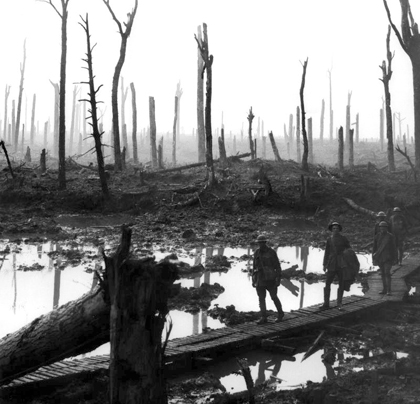
Australian field artillery brigade on a duckboard track passing through the heavily shelled park of the Château de Hooge, Ypres, 29 October 1917. Frank Hurley/Wikimedia Commons
The devastation of Ypres is also chillingly described. I hadn’t realised just how much of the city was destroyed.
Almost completely. Apart from the cathedral and the Cloth Hall, the centre of the city was completely razed.
So what would you say we see when we visit today Ypres today? Is it a bit of a theme park, a lovingly restored medieval city, or something in between?
I always have a double feeling when I travel to Ypres – and I’ve travelled there a lot recently as I’m part of the war centenary in Belgium – because indeed it’s a kind of fake medieval town. On the other hand I think it’s good that people rebuilt it. Churchill had plans to turn it into a monument, his proposal was to leave it as it was as a reminder, but from day one, from 12 November, people just returned and started to rebuild it. Old farmers returned to No Man’s Land, even to villages that were completely gone, and they replanted and started to rebuild. And then they realised they were standing on probably the biggest copper mine in history, so they started to take up the explosives. By doing so they turned over the soil so all the sick soil was buried and healthy soil came up to the surface, so they could farm again. If you look at satellite photos of the region, you can still see the open wound of No Man’s Land from the air, and approximately 80 per cent of the shells are still there, in some places starting to pose problems as they are oxidising and gasses are released into the soil.
That puts me in mind of the episode in which Helena and Matthew visit Alsace, right after the war when all the weaponry is still on the battlefields, and soldiers who survived are taking their wives and girlfriends to show them around – and she’s outraged…
Yes, she’s furious. She says it’s like people coming to watch when two trains have collided. And her husband says no, I think it’s understandable that people want to see the place where their lovers or their husbands or their sons or their brothers were killed. There will be voyeurs among them, of course, but you also see in Alsace, and in Ypres earlier on, the industry of war. Souvenirs, farmers turning shells into vases to put flowers in – it started early. And again, I have mixed feelings. It’s a bit tasteless, but on the other hand if you’re a farmer and you’re returning to a farm that has been completely blown away, you have to make money from something.
And she does in fact grow to understand “what weird forms desperation can take in a human being, how the pleasure of bewilderment carefully shields us from a fear or despair that might totally destroy us.”
Yes, which I think is true.
And yet beneath that protective shield is the realisation that history, by definition, is too neatly packaged. She ponders: “Can we ever do anything else… but tell fairy stories burdened with footnotes?”
Of course it is not something out there buried under the sand like the tomb of a pharaoh and we just have to brush away the sand and there we find historical truth in all its splendour. The answers that history can provide depend on the questions we pose, and we put different questions and the answers are never fully clear, so history in essence is a debate. And of course there is the tendency because we are human beings to put it into neat narratives and to close it.
Helena also frequently reflects on the impotence of words compared to the emotional immediacy of art, music and photography – although this is in fact undercut by some of the descriptions in her own narrative…
It’s true, that’s the paradox of the book, of course.
In fact her descriptions are precise and powerful, for example, “the high-pitched, ethereal squeak of the bats which sailed round the tops of the beeches and the crunch when an insect was ground up in their jaws”, and the many memorable graphic descriptions of the wounded in military hospitals – or of a young girl whose skull is sliced open by shrapnel as she runs to join her playmates. But in the end, do you think the written word is challenged by other art forms?
I don’t know, I’m not so pessimistic as Helena is in the book. That’s maybe because I also played music. I had two big loves: music and writing. I did classical music until I had to choose between pursuing a professional career in music or writing, and the mysteries of writing won out. But along the way I learned a lot about making sentences and language as musical as possible. So I don’t accept the view that language only focuses on the cognitive aspects. Language has colour, has music as well, and rhythm, and if that weren’t the case we wouldn’t have poetry. And of course I just liked creating Helena with all her distrust of words and language, of the inferiority of words compared to the other arts, and at the same time writing this book, which denies all of these concerns.
And actually it’s really her mother’s voice that’s nagging at her, isn’t it?
Actually I loved her mother. She’s one of the characters I created because when the beginning of the book was taking shape I felt Helena’s nature was so strong I had to put some counterweights around her. And the more she developed as a character, the more fond of her I became.
She’s definitely the kind of memorable matriarch that you find in TV costume dramas, played by a leading character actress.
Yes, probably. I like her tautologies like “a chicken is a chicken, you shouldn’t give them names.”
Accounts likes Mary Borden’s, and even more so the Great War poets saw through the propaganda that the public was fed during wartime – of what Robert Graves called “The old Lie; Dulce et Decorum est / Pro patria mori.” But it still goes on, and the public at large still tends to fall for its own side’s propaganda. I don’t understand why that would happen. Have you got any insights?
No, it seems that our ability to become a little bit wiser is perhaps not as big as we would wish.
Is it just that we’re programmed to act out of self-interest?
Maybe. Maybe it’s also fear of the uncertainty of allowing ourselves other points of view. It’s easy as it were to lock yourself away in your certainties and not question them.
Coming back to your writing as a whole, your first novels were brilliantly received. But did that fill you with freedom, fear, doubt…?
No, I’ve been writing since I was I think 11, it was and still is first of all some existential need in me. It’s also a source of profound joy for me to be able to write, and reviews and chatter and the press and praise are something I keep at a distance. I think there are two great mistakes you can make as an artist, but maybe as a human being in general. You shouldn’t identify with your own success – you may be glad of it, I certainly am proud of it too – but I don’t identify with it in the sense that every morning in the bathroom I look in the mirror and say: “You are such an accomplished writer!” I always say I don’t mean to mystify things. I’ve said to journalists before that writing in a sense is trying to figure out what my talent wants: there’s a book you want to write, but there’s always a book that has to be written. And if you only write the book you want to write, you won’t write a good book. And the second mistake is if there is a lack of success, you shouldn’t really identify with that either because then you become depressed. So it’s a way of keeping a healthy distance, and to this day I experience writing as a great personal freedom, and anything ulterior about it really comes in second place.
Another thing you did recently was to translate Virginia Woolf’s Between the Acts. What attracted you to that particular book?
Well obviously from early on I’ve loved the work of Woolf and a lot of British literature, and I simply discovered it was her only novel that hadn’t been translated into Dutch. I told my publisher, who also brings out all of Woolf’s novels, that I wanted to do it and he said of course, and so we did.
And how long did that process take?
Well, some people go fishing on a Sunday; my Sunday fishing was doing some pages of the novel, so in total in took me maybe six years, but only on a weekly basis.
Your latest novel, The Reflections (published in Belgium in March 2014) is a companion novel to While the Gods Were Sleeping. How do the two books interconnect?
Well, the story is told by Edgard, Helena’s brother, but it moves away from the post-war decades, and while Helena’s story is very much about words and memory and collective scale, this is a kind of reversal. It’s very personal, it’s a story about how the war and its history are really written into his flesh – quite literally in his battle scars – and how he tries to find a place for himself in life and in the world since that war. And it turns out he has had a life-long affair with Helena’s husband…
So will there be a third book in this cycle as well?
Probably. I start with text and voices manifesting themselves, so I have a loose pile of papers that more or less is Matthew’s story, but we’ll see how it turns out.
How much of your poetry has been published in English?
None. Not in any other language. Publishers seem to be very afraid of poetry.
So what are your thoughts on the challenges of translating poetry versus fiction?
I like to translate poetry. It’s something I do on Sunday mornings just for fun because it mobilises everything you have in terms of vocabulary and semantic subtlety. That’s also why I love poetry, because it’s to me the most essential use of language we have.
Have you often translated the same poem more than once?
Yes, sure. When I’m writing poetry myself I can make in one day maybe 200 versions of one verse, and when I translate I like to do the same, to see what kind of facets and possibilities are in there. It’s an endless game.
In less than two months my mother became an utterly other person, her memory totally wiped out. Being preoccupied with memory, this was something I had to write.”
How closely did you work with Paul Vincent on the translation of this book?
Quite close from the early version onwards, I read it and gave comments and answered questions. I think it’s a brilliant translation. In the original, of course, I’d written most of the dialogue for instance between Helena and Matthew in English, and most of her dialogue with her mother is in French, because I wanted to have that hybridity in the body of the text itself because at that time during the occupation in Belgium more than fifty nationalities were present through the foreign and colonial armies, so I wanted to have that hybridity also audible, or readable, in the book itself. Now of course the book is completely in English, so that is an aspect that inevitably has been teased out. But I love the translation.
What have you been working on lately?
Well I’m always at work, so I’ve finished the first draft of a theatre play, I’ve written Reflections, I’m always writing poetry, and now I’m sniffing at that other pile of paper which will probably turn out as Matthew’s story.
Is it strange to be talking again about this book some years after Dutch-language edition was published?
It’s always a bit strange, because I’m always relieved when a book is out of my hands. It was immediately called a modern classic in Belgium, which made me very proud – and meant I had to give a lot of interviews. And the book has since been translated into German, English now, Spanish and other languages. It always comes back like an echo but I like it, it’s good to see my children travel the world and meet new friends.
Next to be published here next spring will be Stammered Secrets, which I understand is a fictionalised account of your mother’s battle with Alzheimer’s from the age of just 57. The much older Helena is very lucid, even authoritative, about the episodes she evokes from her past. So do Helena’s and your mother’s situations have much in common?
No, not really. My mother became gravely ill in the months after While the Gods Were Sleeping came out in Belgium, which was a devastating experience because in less than two months she became an utterly other person, her memory totally wiped out. So for me in my work, being preoccupied with memory, of course, witnessing my mother losing all her own memory was something I had to write, because I felt myself becoming depressed by the experience. I don’t like the term therapeutic writing, I just had to register the impact it had on me and my family, the narrative we weave around the people we love, and feeling the whole thing unravel.
So would you say the book is fictionalised, or is it straight autobiographical writing?
Of course the situation is taken from real life, but it also in a sense provoked me to use metaphor and very intense language as a kind of weapon against the destruction. So it’s both. It’s emotional, it’s not sentimental, it’s not euphemistic, it tells things as they are, but I hope in a language that, as it were, saves our dignity.
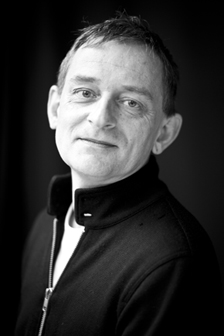 Erwin Mortier was born in Ghent in 1965. His debut novel Marcel (1999) was awarded several prizes in Belgium and the Netherlands and critically acclaimed throughout Europe, and was followed by My Fellow Skin and Shutterspeed (both 2000). He has also published volumes of poetry and essays, and is a regular contributor to newspapers and literary magazines across Europe.
Erwin Mortier was born in Ghent in 1965. His debut novel Marcel (1999) was awarded several prizes in Belgium and the Netherlands and critically acclaimed throughout Europe, and was followed by My Fellow Skin and Shutterspeed (both 2000). He has also published volumes of poetry and essays, and is a regular contributor to newspapers and literary magazines across Europe.
While the Gods Were Sleeping is shortlisted for the 2015 Independent Foreign Fiction Prize and published by Pushkin Press, along with his earlier novels.While the Gods Were Sleeping and his earlier novels are published by Pushkin Press.
Read more.
erwinmortier.be
++ NEWS UPDATE 13 April 2015: While the Gods Were Sleeping is shortlisted for the 2015 Independent Foreign Fiction Prize. Read more.
Mark Reynolds is a freelance editor and writer, and a founding editor of Bookanista.

